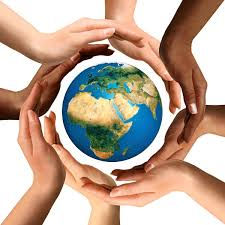The Role of Religions in Creating a Peaceful, Just, and Sustainable Planet
- Ray Gutoski
- May 26
- 3 min read

In a time of rising division, environmental crisis, and social injustice, many people question the role of religion in solving global problems. But across faith traditions, one truth remains: at their core, religions exist to uplift life, awaken conscience, and unite humanity.
As Kareem Abdul-Jabbar eloquently put it:
“The purpose of religion is to unite human beings, not to divide them.”
While history includes examples of religion being misused to justify conflict or oppression, these are distortions—not reflections—of spiritual truth. At their best, the world’s religions point toward peace, compassion, justice, and stewardship of the Earth.
A Moral Compass for Humanity
Pope Francis, in his landmark encyclical Laudato Si’, called for an “ecological conversion” rooted in love and reverence for all life. He stated:
“Living our vocation to be protectors of God’s handiwork is essential to a life of virtue; it is not an optional or a secondary aspect of our Christian experience.”
The Pope has consistently emphasized that climate change, poverty, and war are not only political issues, but moral and spiritual challenges—and that faith must lead people to act in defense of the vulnerable and the planet.
Similarly, Buddhist leader Daisaku Ikeda, president of the Soka Gakkai International (SGI), emphasizes the dignity of life as the foundation of peace. In his annual peace proposals to the United Nations, he urges a global shift from violence and domination to dialogue and respect for all life. He writes:
“A genuine religion must always call forth the courage to confront injustice and promote unity, not division.”
Ikeda believes that all people, regardless of background or belief, have the power to awaken to their inner goodness and become agents of positive change—a concept rooted in his philosophy of “human revolution,” the idea that inner transformation leads to social transformation.
The Potential of Interfaith Unity
Religions have immense influence, not only spiritually but socially and culturally. Together, they represent billions of people across the globe. When they collaborate—not in competition, but in solidarity—they become a powerful force for healing the planet.
We are seeing this already:
Interfaith alliances working for climate justice
Religious leaders standing with marginalized communities
Faith-based groups building schools, hospitals, peace centers, and humanitarian aid efforts
Spiritual educators teaching nonviolence, compassion, forgiveness, and gratitude
These are not isolated efforts. They are signs of a growing movement—one in which religion reclaims its highest role: not to judge, divide, or dominate, but to protect life, promote justice, and awaken the interconnectedness of all people and nature.
How to Involve Your Own Local Religious Group in Changing the Planet
You don’t need to be a world leader to make a difference—your local religious community can become a powerful force for good. Here are simple, meaningful ways to get involved and lead change:
1. Start a ConversationDiscuss global issues—like peace, poverty, racial justice, or climate change—during study groups, sermons, or social events. Ask: What does our faith teach us about this, and how should we respond?
2. Organize Community ActionsForm a peace or justice committee. Host donation drives, environmental cleanups, or service days. Partner with other local groups for greater reach.
3. Promote Interfaith CollaborationConnect with nearby churches, temples, mosques, or synagogues. Plan events around shared values like compassion, sustainability, and human dignity.
4. Inspire Your Religious Leaders to Mobilize Members for Global GoodEncourage pastors, priests, imams, rabbis, monks, and spiritual leaders to:
Speak out for peace, justice, and nuclear disarmament
Encourage members to volunteer with local, national, and global organizations working for social change
Host events on topics like planetary sustainability, youth empowerment, or the abolition of nuclear weapons
Collaborate with peace movements, environmental coalitions, and human rights organizations
5. Educate and Empower Your CommunityHost guest speakers, film nights, or discussions on the role of faith in creating a better world. Use free materials from interfaith, environmental, and disarmament organizations.
6. Live the MessageEncourage members to live more consciously—reducing waste, conserving energy, supporting ethical causes, and embodying kindness in everyday life.
“Small acts, when multiplied by millions of people, can transform the world.” – Howard Zinn
Conclusion: Religion as a Force for Planetary Healing
To meet the challenges of our time, we need not only science and politics—but the deep moral force that religion can offer. When local communities live their highest spiritual values through action, they help build a peaceful, just, and sustainable world.
“The solidarity of ordinary people awakened to the dignity of life is the greatest force for peace.” – Daisaku Ikeda
Would you like this version formatted into a downloadable guide or promotional flyer for use in faith communities or interfaith events?



Comments